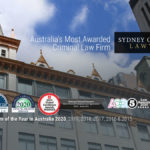Boy Shafted by Prosecution and Own Defence Lawyer

Imagine this: you are a 15-year-old boy brought into the police station for questioning about a stabbing murder which occurred during a fight between two groups of young males.
Due to your age, you are given a ‘support person’ who later tells police you confessed to the killing.
You deny ever saying such a thing and contend you did not stab or kill anyone.
You are charged with murder and your case goes to trial.
At trial, the support person testifies that you confessed to stabbing the deceased. The prosecution says this evidence is so powerful that the jury should find you guilty.
The jury is convinced, returning a guilty verdict. The judge then sentences you to a minimum term of 16 years in prison.
You spend 7 years in prison before receiving some news which leaves you floored:
Unknown to you, the ‘support person’ was a registered police informant, Shawn Clayton, who was charged with fraud and received a reduced penalty because he ‘assisted authorities’ by agreeing to testify against you.
By now you’re speechless, until you hear the rest of the news:
Not only did the police know Clayton was a police informant when they testified in court against you, but so did the DPP solicitor and Prosecution barrister, and neither of them brought it to the attention of your defence barrister – a monumental breach of their ‘duty of disclosure’.
But wait there’s more – your very own defence solicitor represented Clayton in the very case for which Clayton received a discount on sentence for testifying against you – in what was later described in the NSW Supreme Court as an “undisclosed conflict of interest”.
So your solicitor got paid for both cases while you got slotted and sent to prison!
Why was the information about Mr Clayton so important? Because it would have allowed your defence barrister to ‘cross examine’ both Clayton and the police witnesses about Clayton’s motivation for claiming you confessed to him. What was that motive? To get a reduced sentence, which he indeed ended-up getting for testifying against you, represented by your very own solicitor!
The informed cross-examination of Clayton and police could have raised a doubt in the jurors’ minds about whether Mr Clayton was telling the truth, or making it up to get himself ‘off the hook’.
A movie plot? Not at all. This is precisely what happened to ‘JW’ – who cannot be named because he was just 15-years-old when charged with murder right here in NSW.
All agree it was a ‘miscarriage of justice’
JW exhausted all of his regular grounds of appeal.
However, when the ‘failure to disclose’ came to light in 2014, his new lawyers made an application to the Supreme Court under section 78 of the Crimes (Appeal and Review) Act 1912 (NSW) for an ‘inquiry’ into the reliability of his conviction “based upon material discovered subsequent to the exhaustion of the avenues of appeal”.
The application sought a referral to the New South Wales Court of Criminal Appeal (NSWCCA) for an “appeal of the whole case”.
In Court
The application came before Justice Hulme of the Supreme Court on 14 November 2014, and was supported by none other than the NSW Attorney-General herself, who submitted as follows:
“First, there was non-disclosure of material by the Crown Prosecutor and instructing solicitor from the Office of the Director of Public Prosecutions (ODPP) at the trial to the defence. It was not known to the applicant nor disclosed to his defence counsel during the trial that a prosecution witness at the applicant’s trial, A107, whose evidence as to admissions made to him by the applicant formed a central plank of the prosecution case, was at the time of the alleged admissions a registered police informer. This non-disclosure was in circumstances where the Crown case at trial was that A107 was acting as a support person for the then 15 year old applicant at the time the alleged admissions were made.
Although typed notes of the conference attended by A107, the Crown prosecutor and the ODPP instructing solicitor on 27 July 2009 were served on the applicant’s legal representatives and became Exhibit C on the voir dire concerning the admissibility of the admissions, these typed notes appear to have been edited as they did not include any reference to A107 stating that he was a police informer. (It is noted that this information was not known to prosecution counsel in the applicant’s appeal to the CCA, nor in his special leave application to the High Court, at the time of either of those proceedings.)
Secondly, there was non-disclosure of material by police. It was not known to the applicant nor his defence counsel, nor the ODPP, that was given an affidavit of assistance by a Chief Inspector of Police prior to the trial, which was tendered before Parramatta Local Court at A107’s sentence hearing for two offences against s 178BB(1) of the Crimes Act 1900. That affidavit of assistance included a reference to the assistance provided in relation to the applicant’s matter. Furthermore, police officers gave evidence of their conversation with A107 during the trial without disclosing his true status as an informer.
Thirdly, the applicant’s solicitor had an undisclosed conflict of interest. It was not known to the applicant nor his defence counsel (including on appeal) that the applicant’s solicitor at the applicant’s trial, Robert Kaufmann, who had commenced to act for the applicant from the time that the applicant was charged, was already acting at that time for A107 in respect of the fraud offences.
Mr Kaufmann continued to act for A107 until finalisation of A107’s sentence proceedings for the fraud offences at which the affidavit of assistance was tendered, even though he was acting for the applicant during the same period. He continued to act for the applicant for the duration of the applicant’s trial and the applicant’s appeal to the CCA.”
Justice Hulme wasted no time in referring the case to the NSWCCA in a very short judgment, saying:
“… I have come to the view that the matter should be determined with some urgency in the light of further submissions that were filed by senior counsel for the applicant on 5 September 2014.
Accordingly I do not propose to provide detailed reasons which are not generally required in relation to this administrative task and certainly not in this case where there is no controversy as to the outcome.
I confirm that I have read and considered the entirety of the material provided in support of the application. There are a number of questions about the integrity of the trial process that led to the jury’s verdict. I am left with a sense of unease or disquiet about the applicant’s conviction.”
The NSWCCA handed-down its judgment on 29 April 2016, allowing JW’s appeal and quashing his murder conviction.
The case is a shining example of how the conduct of the prosecution, police and even a person’s own defence lawyer can result in an unfair conviction and a very, very long prison sentence.






